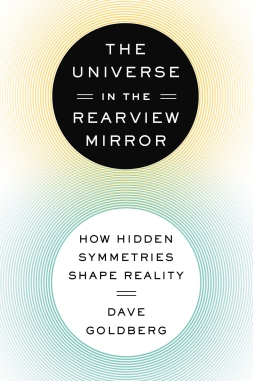In his newly released book
The Universe in the Rearview Mirror: How Hidden Symmetries Shape Reality (Penguin Group USA, 352 pages), physics professor and science columnist Dave Goldberg makes the jaw-dropping argument that based on everything that he and his fellow scientists have seen in their laboratories, you and I shouldn’t exist—and neither should he nor the sun nor the Milky Way Galaxy for that matter. He then proceeds to prove that your existence and everybody else’s are just the result of an almost unfathomable luck—an existence not just predicated on the amorousness and luck of our ancestors but on an almost absurdly finely tuned universe.

Goldberg’s central thesis is that while randomness may seem to rule our lives, it’s never able to erase the fact that space, time, and everything in between in our elegant universe—from the Higgs boson to antimatter to the most massive group of galaxies—are invariably shaped by hidden symmetries. He says that it’s for this reason that the concept of symmetry is the unsung great idea behind all the big physics of the past one hundred years and, he predicts, will remain so far into the future.
“The history of physics, in fact, is a marvel of using simple symmetry principles to construct complicated laws of the universe,” Goldberg explains. “Einstein quite famously was able to construct his entire theory of special relativity—the idea that ultimately gave us E=mc2 and explained the heat of the sun—from nothing more than the simple idea that there was no measurable distinction to be made between observers at rest and observers in uniform motion. The long-overlooked 20th-century mathematician Emmy Noether proved the centrality of symmetry as a physical principle. And what is symmetry—at least as scientists understand it? The mathematician Hermann Weyl gave perhaps the most succinct definition: ‘A thing is symmetrical if there is something you can do to it so that after you have finished doing it, it looks the same as before.’”
If the rather formal statement above makes
The Universe in the Rearview Mirror sound like mind-bending science for you, don’t let it intimidate you. Goldberg, a long-time columnist for the popular science website
io.com, actually explains his ideas in simple, highly informative language that’s not only math-free but filled with humor as well. Says the magazine
Nature in its review of the book: “Who knew symmetry could be so brilliantly entertaining? Physicist Dave Goldberg slings the reader straight in at the deep end of this big physics concept, but with enough masterly wit to keep you afloat.”
Read Dave Goldberg’s “Four Reasons You Shouldn’t Exist” in Slate.com now!Read an excerpt from Dave Goldberg’s The Universe in the Rearview Mirror in ScientificAmerican.com now! ABOUT THE AUTHOR:Dave Goldberg is a professor and director of undergraduate studies in the Department of Physics at Drexel University. He earned a Ph.D. in Astrophysics from Princeton University, and currently works on issues in theoretical cosmology, especially on how gravity can distort our view of the universe. Dr. Goldberg is very interested in the interface between science and pop culture. He writes an “Ask a Physicist” column for
io9.com and has contributed to
Slate.com and the
Los Angeles Times.
ANOTHER INTERESTING READING:In “How Did You Become a Writer?”, an essay that came out in
AmericanScholar.org, magazine editor and novelist Brian Doyle says that every time he is asked that question when giving a talk to writing students, he usually prefaces his answer with his usual joke that his urge to write is a form of “a benign neurosis.” After that, he says, he offers this earnest, practical advice about writing: “Do not let writing be a special event… Write a little bit every day. You will be surprised how deep the muck gets at the end of the year, but at that point you can cut out the dull parts, elevate your verbs, delete mere catharsis, celebrate witness, find the right title, and send it off to be published.”
Read Brian Doyle’s “How Did You Become a Writer?” in AmericanScholar.org now!